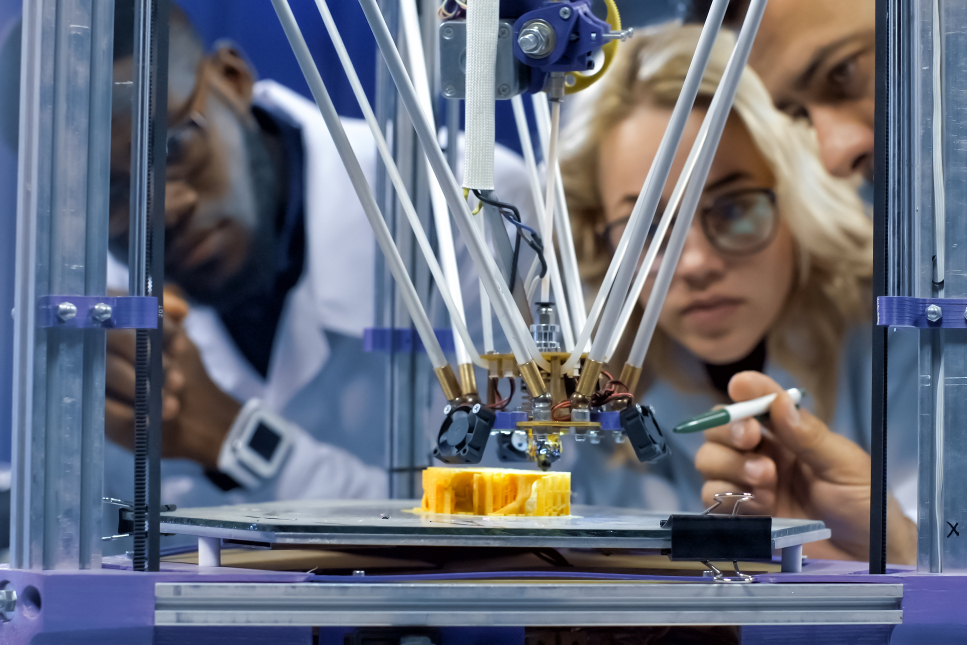Additive bio-manufacturing: 3D printing for medical recovery and human enhancement
Additive bio-manufacturing
Report
Downloads
-
Report
file type pdf - file size 2.7 MB
Download Additive bio-manufacturing: 3D printing for medical recovery and human enhancement

The expectations are high for 3D printing in the medical sector. It is still unclear how this technology will evolve. This report describes the status quo on this issue, and also the challenges it presents for policy-makers.
Authors
Additive bio-manufacturing (bio-AM) is defined here as the use of 3D printing for medical purposes or non-therapeutic “human enhancement”, whether they involve the production of biological material or not. It includes any application for rehabilitating, supporting or augmenting biological functionality. The impacts of bioAM are uncertain, and it is not clear which actions may be required to foster responsible development of the technology.
This study responds to these gaps in our knowledge by describing the state of the art and future development prospects, analysing their wide-ranging impacts - including social, ethical and economic aspects - and identifying key policy challenges along with options to respond to them. Key challenges are to avoid an incoherent, piecemeal adaptation of regulatory frameworks, to support responsible development that improves citizens’ lives, and to foster public participation and citizen-driven innovation. The European RRI approach could provide a useful platform for responding to these challenges, emphasising inclusiveness and co-creation by a wide variety of stakeholder groups, including public participation
Veelgestelde vragen
Een 3D-printer bouwt een product in laagjes op, op basis van een computertekening. Omdat dit laag voor laag gebeurt, heet het ook wel Additive Manufacturing (AM). Verschillende materialen als bouwstof worden gebruikt; van plastic tot chocola. En zelfs biologisch materiaal, zoals cellen, kunnen stuk voor stuk op elkaar worden 'geprint' in de gewenste vorm.
Voor dit rapport over bio-AM of 3D-bioprinten, keken we naar geprinte producten die bedoeld zijn voor mensverbetering, of voor medische doeleinden. Het kan gaan om biologisch materiaal zoals cellen, maar ook om synthetische producten zoals tanden, prothesen of gehoorapparaten.
Nee, compleet werkende organen rollen nog niet uit de printer. Een printer kan cellen in de vorm van een orgaan rangschikken, maar daarmee werkt het orgaan nog niet. Zonder bloedvaten gaan de cellen bijvoorbeeld dood. En binnen één orgaan zijn verschillende typen cellen nodig. Hoe zorg je dat de cellen zich aan elkaar hechten? Al die problemen zijn nog niet opgelost.Het printen van werkende organen is zo complex dat het misschien nooit werkelijkheid wordt.
Onderzoekers verwachten dat in de nabije toekomst het 3D-printen van simpelere structuren zoals huid of kraakbeen wel tot de mogelijkheden behoort.
Op dit moment is 3D-bioprinten vooral een instrument voor het bestuderen van cellen, celgedrag en het verder ontwikkelen van de printtechnologie. Zo wordt er onderzocht of het mogelijk is om leverweefsels te printen om toxiciteitstesten op te doen. Het printen van weefsel zou op den duur dierproeven kunnen vervangen.
We deden dit onderzoek op verzoek van het Europees Parlement. Zij wilden weten wat ze kunnen doen om medische innovaties in 3D-printen te ondersteunen. Op een manier die voordelen voor het bedrijfsleven en patiënten oplevert, én voor de samenleving als geheel.
Innovaties in de biotech-sector leiden vaak tot vragen voor beleidsmakers. Dat geldt ook voor 3D-bioprinten. Aan de ene kant moeten beleidsmakers veiligheid van nieuwe producten kunnen garanderen. Aan de andere kant willen ze de regels niet zo ingewikkeld maken dat ze financiële en technologische drempels voor innovatie vormen.
We werkten voor dit onderzoek samen met een consortium bestaande uit onderzoekers van het Karlsruhe Institute of Technology, Institute of Technology Assessment, Danish Board of Technology (DBT Foundation) and Responsible Technology (RT).
De onderzoeksafdeling van het Europees Parlement op het gebied van wetenschap en technologie, genaamd STOA (Science and Technology Options Assessment), begeleidde het onderzoek.
Voor dit rapport ontwikkelde het Rathenau Instituut vier fictieve toekomstscenario's (techno-moral vignettes). De meerwaarde hiervan is dat deze verhalen mensen op eenvoudige wijze meenemen in kwesties die kunnen gaan spelen. Dit kan leiden tot diepere discussie over de maatschappelijke gevolgen van deze technologie. Een scenario is geen voorspelling. Lees twee van de scenario's hier:
De scenario's zijn ontwikkeld op basis van bestaande technologieën en verwachtingen van experts. Hiermee proberen we de kloof te dichten tussen de huidige stand van zaken van bio-AM en meer visionaire perspectieven en verwachtingen die leven in het wetenschappelijke veld. Scenario’s zijn een manier om te anticiperen op de toekomst omdat ze aanzetten tot nadenken over de lange termijn. Zo kun je mogelijke problemen voor beleid, regelgeving, en de maatschappij vroegtijdig herkennen en indien nodig maatregelen nemen.
3D-printen heeft verschillende voordelen.
- Dankzij 3D-printen wordt het goedkoper om onderdelen te maken in hele kleine hoeveelheden, of zelfs maar één stuk. Hiermee wordt personalisatie mogelijk. In de medische sector kunnen zo bijvoorbeeld protheses eenvoudiger (en goedkoper) op maat worden gemaakt.
- Producten kunnen decentraal - op de plek waar ze nodig zijn - worden geprint. Bovendien zijn de digitale ontwerpen, eenvoudig te verspreiden. Een printer kan zo veel verschillende producten maken. Daardoor wordt het productieproces in de toekomst sneller en goedkoper.
- De technologie kan bijdragen aan het verminderen van afval, bijvoorbeeld door hergebruik van materialen.
Er zijn veel verwachtingen van de technologie in de medische sector. Denk aan:
- Het 3D-printen van organen – als dit in de toekomst mogelijk zou zijn - is een potentiële oplossing voor een aantal problemen op het gebied van orgaantransplantatie.
- 3D-bioprinten zou een bijdrage kunnen leveren aan het reduceren van dierexperimenten.